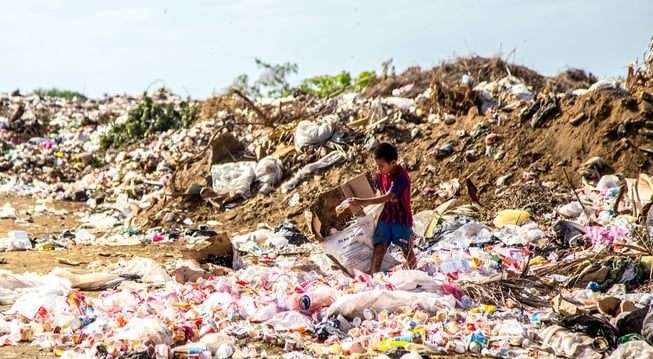 Image courtesy of Hermes Rivera.
Image courtesy of Hermes Rivera.
The ways in which human systems impact the environment also have profound implications for social justice. Nowhere is this more evident than in the realm of waste management.
Waste generation and disposal have profound implications for human communities and the planet we call home. From environmental degradation to the disproportionate burden borne by marginalized communities, the impacts of waste underscore the urgency of addressing climate justice. Embracing zero-waste principles offers a pathway to reducing our ecological footprint and a powerful tool for advancing justice for people and the planet.
Understanding the Principles of Zero Waste
Zero waste is not a simple concept. It’s a comprehensive approach that challenges the linear waste management paradigm and embraces the principles of sustainability, resource efficiency, and social equity. It goes beyond the traditional linear model of "take, make, and dispose" and instead promotes a circular economy where resources are valued and kept in use for as long as possible.
Waste Reduction
At the heart of this is the principle of waste reduction. Instead of relying on disposables, zero waste aims to minimize waste generation at its source. This involves rethinking our consumption patterns, promoting mindful purchasing decisions, and embracing a culture of reuse and repair.
By reducing the demand for new products and minimizing the extraction of natural resources, zero waste mitigates the environmental impact of resource extraction, which disproportionately impacts marginalized communities, while promoting a more sustainable and equitable distribution of resources.
Reuse
Rather than treating items as disposable, zero-waste principles encourage a shift toward a circular economy, where materials are kept in circulation for as long as possible.
This involves repairing, repurposing, and sharing items, as well as supporting businesses and initiatives that prioritize durable and reusable products.
By extending the lifespan of goods of all varieties, we can reduce waste on a large scale and stop some of the environmental degradation that is associated with it.
Recycling and Composting
Recycling and composting are also integral parts of the zero-waste framework.
Recycling transforms waste materials into valuable resources, reducing the need for raw material extraction while conserving energy. Composting, on the other hand, allows for organic waste to be returned to the soil as fertilizer. This closes the loop of disposal and promotes regenerative agricultural practices.
By maximizing recycling and composting efforts, zero waste minimizes the amount of waste sent to landfills or incinerators, which are disproportionately located near poor communities and communities of color.
The Intersection of Zero Waste and Social Justice
Zero-waste principles intersect with social justice profoundly, offering a framework that advances equity for both people and the planet. By addressing the systemic inequities embedded in our current waste management systems, we can foster inclusive and community-driven approaches to promote environmental justice.
One of the key ways that we can do this is by challenging the disproportionate burden of waste on marginalized communities. Historically, waste facilities like landfills and incinerators have been overwhelmingly located in low-income neighborhoods and communities of color.
Marginalized communities often bear the disproportionate burden of waste due to their limited access to political and economic resources, while predominantly white and wealthy communities can utilize their resources to ensure that landfills and incinerators are located far away from their own neighborhoods.
This is one of the manifestations of “environmental racism” that perpetuates systemic inequalities based on race and class, ensuring that poor communities and communities of color bear the brunt of the associated health risks and environmental degradation.
To ensure meaningful community participation in decision-making processes regarding waste management systems, it is imperative to undergo a transformative shift in our political and economic systems. This entails fostering equitable structures that center the voices of those most affected by the detrimental impacts of our current waste management systems, thus empowering them to actively shape and advocate for solutions that align with their local ecosystems and communities.
New practices in zero waste also have the potential to create economic opportunities in these same communities.
If we can focus on local recycling and composting systems, we can stimulate the development of green industries and local entrepreneurship. This can lead to new job creation and skill-building within communities, which can be incredibly beneficial in areas that have historically faced economic disadvantages.
Zero waste can contribute to global efforts to combat climate change, which also disproportionately impacts marginalized communities. Zero waste can directly mitigate greenhouse gas emissions and conserve resources.
Zero Waste Strategies for a Fair and Sustainable World
There are several important strategies that can lead to zero waste and a more sustainable world. These include:
Educating Communities
At the heart of sustainable strategies for a more fair world is reaching out and educating communities about zero-waste principles. Awareness campaigns are important in empowering individuals and communities to adopt more sustainable practices.
Investing in Recycling and Composting Infrastructure
It’s also highly important for governments, corporations, and communities to invest in zero-waste infrastructure. This includes effective recycling and composting programs that enable the recovery of valuable materials, divert them from landfills, and reduce the need for resource extraction.
Embracing a Circular Economy
A circular economy means keeping materials in circulation for as long as possible and avoiding throwing things away that can be reused or fixed. By designing products meant to be recycled and reused, we can ensure that resources are continually utilized in the best way possible.
Reducing Waste at the Source
Reducing waste at the source means shifting the world’s mindset away from consumption and toward conscious purchasing. It involves opting for more durable, reusable, and repairable products in order to minimize the creation of waste, as well as the demand for resource extraction.
Reducing Waste Can Support Social Goals, Decrease Inequities
Waste reduction is often perceived solely as an environmental issue, but its impact extends far beyond the realm of sustainability. By reducing waste, we can also make significant progress toward achieving social justice goals and decreasing inequities within our communities.
The connection between waste reduction and social equity lies in the transformative potential of addressing these systemic injustices that underpin the entire waste generation and disposal model.

